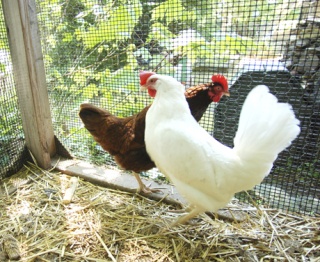If he had to, Chuck Wischman could survive off his backyard. The 73-year-old Island resident has a two-acre Eden of produce: fig, apple, plum and pear trees; an earthly patchwork of vegetables; berries and herbs galore. Enough to feed himself and his wife. Enough for his visiting children. Enough for friends, neighbors and the occasional guest.
“I have plenty, so you might as well share it. People come by and I give things away,” said Wischman, adding that he dries about 150 pounds of fruit a year.
But Wischman is not the only one harvesting his garden. He and his wife, Judie, have opened their backyard up to neighbors and friends. A warm summer’s day is often spent wandering the garden with baskets and clippers. Chatting beneath dangling pears. Working up a sweat over a stubborn turnip root. And in the evening, a feast.
“We hold dinners every two weeks during the summer. It’s about getting together with friends and having something to share,” said Wischman, who raised six children on the property. “We try to use as much as we can from the garden — potatoes, leeks, fresh lettuce, tomatoes and spinach for salads.”
In fact, many on the Island do the same. Hundreds of residents have their own vegetable and fruit gardens. Some raise chickens for fresh eggs. Others keep beehives for honey. Anne Hritzay, believe it or not, does it all.
Among Hritzay’s daily “to-do” list items, somewhere between “laundry” and “pick up kids,” is “feed chickens” and “check on bees.” Her daughters, Allie and Kayla, share the responsibility, as does her husband, Ron Mitchell.
“My husband is the beekeeper,” Hritzay said, showing off a snow-white beekeeper suit. “He’s just always been interested in the process. He’s a real hobbyist and likes when something’s produced.”
One year, the family collected 90 pounds of honey from their two hives. But recently their harvest has been poor.
“It was cold and rainy last year, so it was a poor yield in terms of gathering nectar,” Hritzay said, explaining that bees thrive in warm weather.
Another factor is that bee colonies worldwide are being killed off by a mysterious biological phenomena called “colony collapse disorder,” the Islander added. The cause of this problem is not yet fully understood, although many authorities attribute it to biotic factors such as Varroa mites and insect diseases.
Even on Mercer Island, Hritzay and her husband have struggled to keep their bee colony strong. The couple lost so many bees last year, they were forced to buy an additional pound from a bee farm in Snoqualmie. But Hritzay is optimistic about this season.
“This year, they came through the winter healthy. They look good. I think we’ll have some honey again,” she said.
Contrary to popular belief, honey bees do not obtain most of their nectar from flowers, Hritzay explained. Instead, they take it from various flowering trees and blackberry bushes.
The Island mother said she loves to discuss the science behind bees, especially with young students.
“It’s really nice to share with the children. When you tell them about the bees, you teach them how important they are to our environment,” she said, adding that the same holds true for her chickens, as well as the worms that dwell in the family’s compost bins.
As a Girl Scout leader, Hritzay will bring her troop to the house to observe the chickens and bees. She also brings the honeycombs, stored neatly in a hand-crafted box behind the house, to Island schools and community events.
Hritzay was recently at the Leap for Green Earth Day celebration, with a crowd of young children oohing and awing around her golden honeycombs.
Although she left her chickens behind, another Islander, Charlie Czech, brought his. The fowl were part of a booth promoting urban farming and eating local. Keeping chickens, he said, is not a bad way to start.
“We love the fresh eggs,” said Czech’s wife, Lianne Czech, adding that she collects about seven eggs a day.
The mother of four admitted that the family’s chicken coop, “painted red and white like a barn,” has grown from a few chicks to more than one dozen chickens.
“It feels a little farmy,” Lianne Czech said with a laugh. “But the neighbors have been great about it. We occasionally give them eggs.”
According to Mercer Island city code, Island residents are allowed to raise chickens as long as they do not cause a neighborhood disturbance. This is one reason that there are few — if any — roosters on the Island.
Additionally, the fowl must be kept in “a floor area not to exceed 36 square feet for each lot” that is located “not less than 65 feet from any place of habitation other than the owner’s,” according to RCW 19.07.08. Roaming is restricted to a “fenced area.”
Although there is no city record on the number of Island residents with chickens, Lianne Czech said that she knows at least a handful of Islanders with backyard coops. Some of them, like herself, obtained the chicks from one of the Island’s three elementary schools.
“We brought our first chicks home from my daughter’s kindergarten class at West Mercer five years ago,” Lianne Czech said. “And we’ve brought home more since.”
Indeed, the school district is pushing the “eat local” trend as well.
As part of the district’s science program, kindergartners at all three elementary schools incubate eggs, observing as they develop and hatch into chicks. Once the embryology project is complete, teachers offer the chicks to Island families. Those that are not adopted are sent to a farm.
With the Island’s growing number of eco-conscious parents, it is little surprise that nearly 10 chicks were taken home this year.
That means fewer Islanders driving to QFC for eggs, which means less gas burned, which means cleaner air. And although this difference is small — perhaps miniscule in the end — it is still a difference, nonetheless.



